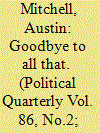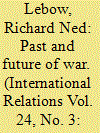| Srl | Item |
| 1 |
ID:
138889


|
|
|
|
|
| Summary/Abstract |
This article is the retirement reflections of an MP of thirty-eight year's standing. The story is mainly one of the decline of the Commons, a decline in the number of ‘big beasts’ and in the calibre of members and the quality of debates to the level of five-minute harangues and the custard pie-throwing of Prime Minister's Question Time. The House has lost its functions of staging the national debate and checking the executive to the media but has gained a new role as a national audit of government's performance and policies through the select committee system. MPs are working harder. Fewer now have outside jobs. They are more focused on their constituencies and though they have fewer powers there, and nationally more and better staff, they also have less respect and less influence. Personally, the end of what has been a long-fighting national retreat from social democracy has been a rear-guard action against the emergence of a colder, harder, neoliberal world. Retirement means relegation to watching that from the sidelines, not ringside.
|
|
|
|
|
|
|
|
|
|
|
|
|
|
|
|
| 2 |
ID:
099795


|
|
|
|
|
| Publication |
2010.
|
| Summary/Abstract |
An original data set of wars from 1648 to the present indicates that security and material interest are rarely the principal motives for war for rising, great or dominant powers. These states far more often go to war for reasons of standing. The empirical evidence offers no support for power transition, balance of power, Marxist or rationalist theories of war. The frequency of war between and among rising, great and dominant powers is likely to decline precipitously because the most important motives for war in the past - standing, security, revenge, material interests and domestic politics - are, for the most part, no longer served effectively by war. Changes in ideas, not changes in material conditions, are primarily responsible for this transformation.
|
|
|
|
|
|
|
|
|
|
|
|
|
|
|
|